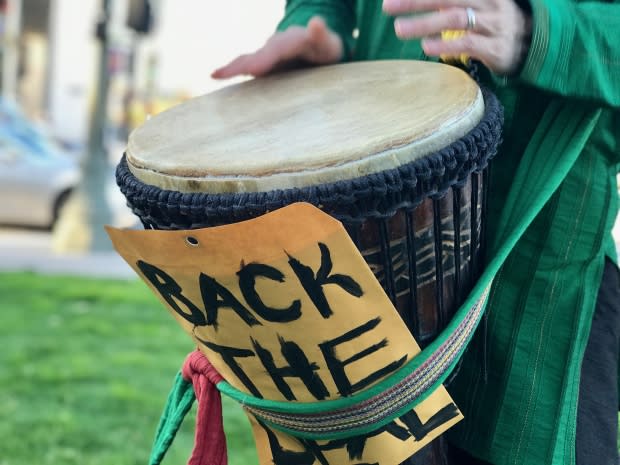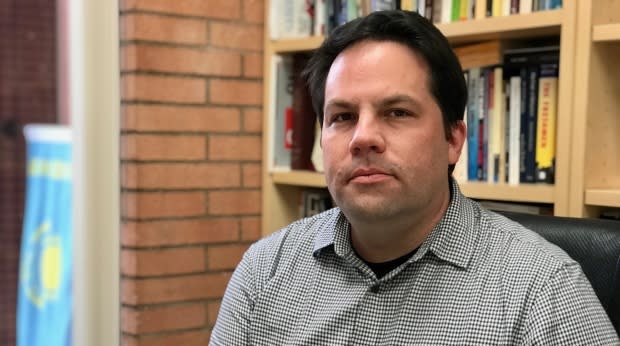How California is building its own wall of resistance against Trump
On a street corner in Santa Monica, about 20 people, most of them students, are nodding their heads to the beat of a drum, gathering up their signs, ready to march.
Their destination is symbolic of how far left California is shifting.
These activists aren't targeting U.S. President Donald Trump or even a Republican politician; they're storming the Los Angeles office of Democratic Sen. Dianne Feinstein, urging her to adopt a sweeping — and controversial — climate change and jobs package known as the Green New Deal, championed by a newly energized progressive faction within the Democratic Party.
California has a long history of left-wing activism, but these days there's renewed energy among progressives, says Natalie Rotstein, one of the organizers of the march, which took place late last month.
The 21-year-old neuroscience student at UCLA is an activist with the Sunrise Movement, founded in 2017 by young progressives that advocate political action on climate change. The group gained national notoriety a week after November's midterm elections, when 200 activists held a sit-in in House Speaker Nancy Pelosi's office and were joined by 29-year-old Congresswoman Alexandria Ocasio-Cortez, who has championed the Green New Deal.
Watch: Young activists stage sit-in protest at Nancy Pelosi's office
Rotstein says grassroots resistance in California is growing bolder because the state is at the confluence of two issues that define the Trump agenda.
"Anything involving border policy affects us, anything involving climate policy affects us," said Rotstein. "All the [Trump] administration issues hit California harder than a lot of other places."
And with Trump ever-focused on building his wall along the Mexican border, many California Democrats are responding with their own wall of resistance.

On Friday, California's new governor, Gavin Newsom, announced that the state plans to sue the Trump administration over the president's declaration of a national emergency in order to appropriate funds for the construction of the wall.
"President Trump is manufacturing a crisis and declaring a made-up 'national emergency' in order to seize power and subvert the constitution," Newsom said in a statement. "Our message back to the White House is simple and clear: California will see you in court."
Earlier in the week, Newsom had ordered the removal of hundreds of the state's National Guard troops deployed at the border at Trump's request — a move the governor dismissed as "political theatre."
And he used his first State of the State address to portray himself as a shield against the president, rebuking Trump's vision of America as "fundamentally at odds with California values."
A 'bit more partisan'
California's new governor seems "a little bit more partisan" than his predecessor, Jerry Brown, according to Christian Grose, a political scientist at the University of Southern California who studies partisanship.
"Now that he's governor, he seems to be wanting to make the case that he's going to be pushing back against the Trump administration, especially regarding immigration and social policy," said Grose. "I think it's an easy way, in a Democratic state that doesn't like Trump very much, to stay popular."

Trump's approval ratings in California are among the lowest in the country. Grose says the results of November's midterm elections may be playing a part as well: California Democrats picked up seven Republican-held seats in the House, giving them a 46-7 advantage in the state's congressional delegation.
"Democrats got more votes in nearly every state in the country for the U.S. House in 2018 compared to 2016," Grose said. "In California, it was even bigger ... the swing in the direction of the House was really huge for the Democrats."
Health care as resistance?
That might explain why California's Democrats have tried to stymie Trump's agenda with legislation and lawsuits.
Newsom has proposed that California offer its own health-insurance subsidies to families earning up to $150,000, and wants to expand the state's Medi-Cal coverage to all Californians until they're 26, including undocumented immigrants. He also signed an executive order that would create a single-purchasing system for medication.
In January, California Attorney General Xavier Becerra, along with 16 other attorneys general, appealed a ruling by a federal judge in Texas that declared the entirety of the Affordable Care Act unconstitutional. It's one among almost 40 lawsuits launched by the state in the last year-and-a-half on a variety of federal issues, from the Clean Air Act to net neutrality.

Even though Grose acknowledges voting patterns show California has become "more Democratic and, maybe more importantly, less Republican," there's a danger that these new progressives will push Democratic politicians so far left that they'll be out of touch with mainstream voters.
It'll be up to more middle-of-the-road Democrats, he says, to act as a political rudder.
"I think they have to have a moderating influence or else they won't win in 2020," said Grose. "You could see this swinging back to the Republicans, with the right kind of Republican."
But many California progressives point to demographic trends, which suggest the U.S. electorate is becoming younger and more diverse — a Democratic advantage. If they want to energize this growing base, playing it safe isn't an option.

"Being a Democrat isn't enough — not by a long shot," said Jon Pelzer, who mounted an unsuccessful challenge from the left against the incumbent Democrat in California's 30th District during November's midterms.
But he says he's still determined to push Democratic politicians past their progressive comfort zone.
"During the original New Deal, a civil rights leader came to FDR [Franklin Delano Roosevelt] with some legislation that he wanted him to support. FDR said: 'That's great. Now go out and make me do it.'
"We're out here to make them do it."
As for the protesters standing outside Feinstein's office in Santa Monica, those like Brendan Lett say it's only through grassroots movements that California can become not just the resistance, but the alternative.
"It doesn't work anymore to be part of the establishment … Washington is so separated from the people," said Lett. "And Trump is just kind of an example of why."


